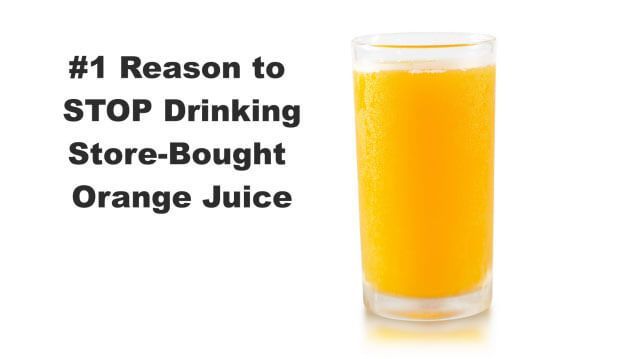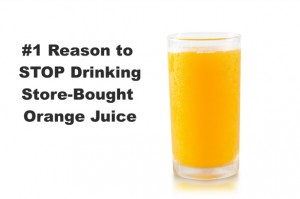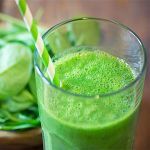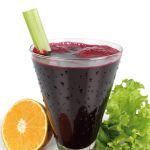
While organic, freshly squeezed orange juice is a great complimentary drink for a well-balanced diet, store-bought orange juice is far from healthy. Although there are many reasons to stop buying conventional orange juice, there is one reason that trumps all others as it can greatly damage your health.
So what makes conventional orange juice so bad for you?
First, let’s take a look at how it’s made. Is it just squeezed from oranges and added with water? Nope, if only it were that simply processed. After the juice is squeezed, oxygen is removed from it to preserve the juice. In the process of removing oxygen, a lot of the natural flavors are lost and sometimes replaced with artificial ones. So what is added to your juice other than water?
Well, commercial orange juice is usually either pasteurized or reconstituted. You rarely get the real deal. You sometimes get OJ with salt added or flavor packs.
After squeezing the juice from oranges, it is stored in large holding tanks. Afterwards, all of the oxygen from the juice is removed. This is done to extend the shelf life of the juice. When the oxygen has been removed, a flavor pack is added. These flavor packs are provided by fragrance and flavoring companies, often the same companies that manufacture perfume.
The flavor packs added to orange juice in the United States often contain ethyl butyrate. According to Toxipedia.org, ethyl butyrate “is commonly used as an artificial flavoring, such as pineapple flavoring, in alcoholic beverages (i.e. martinis, daiquiris, etc.); solvent; in perfumery products and as a plasticizer for cellulose. In addition, ethyl butyrate is often also added to orange juice, as most associate its odor with that of fresh orange juice.”
The top reason for not buying conventional orange juice
The process for creating commercial orange juice not only removes some of the natural flavors and ingredients, it also involves reconstituting or pasteurizing, adding flavor packets, and preserving to maintain freshness. However, these are not nearly as bad for your health as the following information. The reason most people buy commercial orange juice is for its vitamin C content. But to say it is natural is a lie! The vitamin C does not come solely from the oranges that are juiced. In the process of creating conventional orange juice, a chemical called ascorbic acid is added. Ascorbic acid is simply artificial vitamin C.
According to the 1956 Applied Trophology article entitled “What Is a Vitamin?” a vitamin is “a working process consisting of the nutrient, enzymes, coenzymes, antioxidants and trace mineral activators.” Research published by Robert Hardt, an epigenetic biochemical analyst, in his paper “Dangers of Synthetic Vitamins” reveals that synthetic vitamins, like ascorbic acid, are isolated chemicals that only mirror the benefits of whole, natural vitamins.
Nobel Prize laureate Dr. Albert Szent-Georgi discovered vitamin C in 1937. He tried to cure scurvy, a disease caused by vitamin C deficiency, but to no avail. Although his isolated ascorbic acid mirrored the effects of vitamin C, it was not effective in curing scurvy. In contrast, vitamin C from natural sources has been found to cure scurvy. When you buy something that is “fortified” including fortified orange juice or a multivitamin, you are not getting the same benefits that you would from eating whole foods.
Ascorbic acid, in particular, is not only bad for you because it is artificial, it also has other detrimental effects. Ascorbic acid can cause problems in people who take it regularly. Ingesting more than 500 milligrams daily can increase the incidence of arterial plaque buildup.
Excess ascorbic acid consumption has also been linked to an increase in gallstones. Double the dose, and it can interfere with antioxidant enzymes and inhibit endurance in athletes. Furthermore, synthetic vitamin C can contribute to the development of genotoxins that can lead to cancer.
Natural sources of vitamin C
While oranges contain 93 percent of your daily recommended intake (DRI) of vitamin C, other fruits and vegetables actually exceed your DRI. For instance, pineapple, strawberries, broccoli, brussel sprouts and bell peppers contain over 100 percent of what you need each day. Papaya actually contains double the amount of vitamin C you need in a day!
These fruits and vegetables are low in calories and rich in fiber, antioxidants, enzymes and trace elements. In other words, they contain complete vitamins and are absorbed easily by your body the way nature intended. If you decide to buy orange juice, make sure it is organic and without any added ingredients.
Locally-sold orange juice is even better. The best option for orange juice is to squeeze it yourself. If you have arthritis, or just don’t want to wait to squeeze all the oranges necessary to make orange juice, there are now electric citrus juicers that will do all the work for you instantly.
For an even greater health boost, you can easily juice your own blends at home. Citrus fruits add flavor to vegetable juices, and since a little goes a long way, you won’t break the bank when purchasing your ingredients. Try these recipes that incorporate the smart, sweet tang of citrus juice to reap a wealth of nutritional rewards.
|
Orange and Green Juice
This power-packed juice blend is the perfect pick-me-up after a long day. Not only will this drink boost your immune system but it will also reduce inflammation.
|
|
|
|
|
Servings
1 serving
|
Prep Time
|
Cook Time
no cook
|
- 1 brussel sprout
- 1 cucumber
- 2 small oranges
- 1/4 pineapple
- 5 handfuls of spinach
- Process ingredients through a juicer, alternating the ingredients as you go.
|
Citrus and Beet Blend
Loaded with vitamin C, fiber and potassium, this easy-to-make drink is nutritious and delicious. Enjoy this blend after a hard workout or anytime during the day for a great-tasting energy boost.
|
|
|
|
|
Servings
1 serving
|
Prep Time
|
Cook Time
no cook
|
- 1 small beet
- 2 leaves of red cabbage
- 3 medium carrots
- 1/2 lemon
- 1 orange
- 1/4 pineapple
- 2 handfuls of spinach
- Process ingredients through a juicer, alternating between the harder vegetables and softer fruits.
Now get busy juicing, and enjoy!
—The Alternative Daily
Sources:
http://www.med-health.net/Benefits-Of-Orange-Juice.html
http://consumerist.com/2011/07/29/oj-flavor-packs/
http://www.thedoctorwithin.com/vitaminc/ascorbic-acid-is-not-vitamin-c
http://www.radiantlifecatalog.com/whats_wrong_with_ascorbic_acid
http://www.thehealthyhomeeconomist.com/beware-of-ascorbic-acid-synthetic/
http://lpi.oregonstate.edu/mic/vitamins/vitamin-C/supplemental-forms
http://www.academia.edu/5998423/DANGERS_OF_SYNTHETIC_VITAMINS_PDF_-Google_Search
http://www.sciencedaily.com/releases/2001/06/010615072358.htm
https://www.sciencebasedmedicine.org/antioxidants-and-exercise-more-harm-than-good/
http://articles.latimes.com/2000/mar/03/news/mn-5015
http://www.ncbi.nlm.nih.gov/pubmed/11408659
http://www.goodhousekeeping.com/health/diet-nutrition/g1926/top-sources-vitamin-c-44102808/
http://www.health.com/health/gallery/0,,20745689,00.html
http://www.whfoods.com/genpage.php?tname=nutrient&dbid=109




